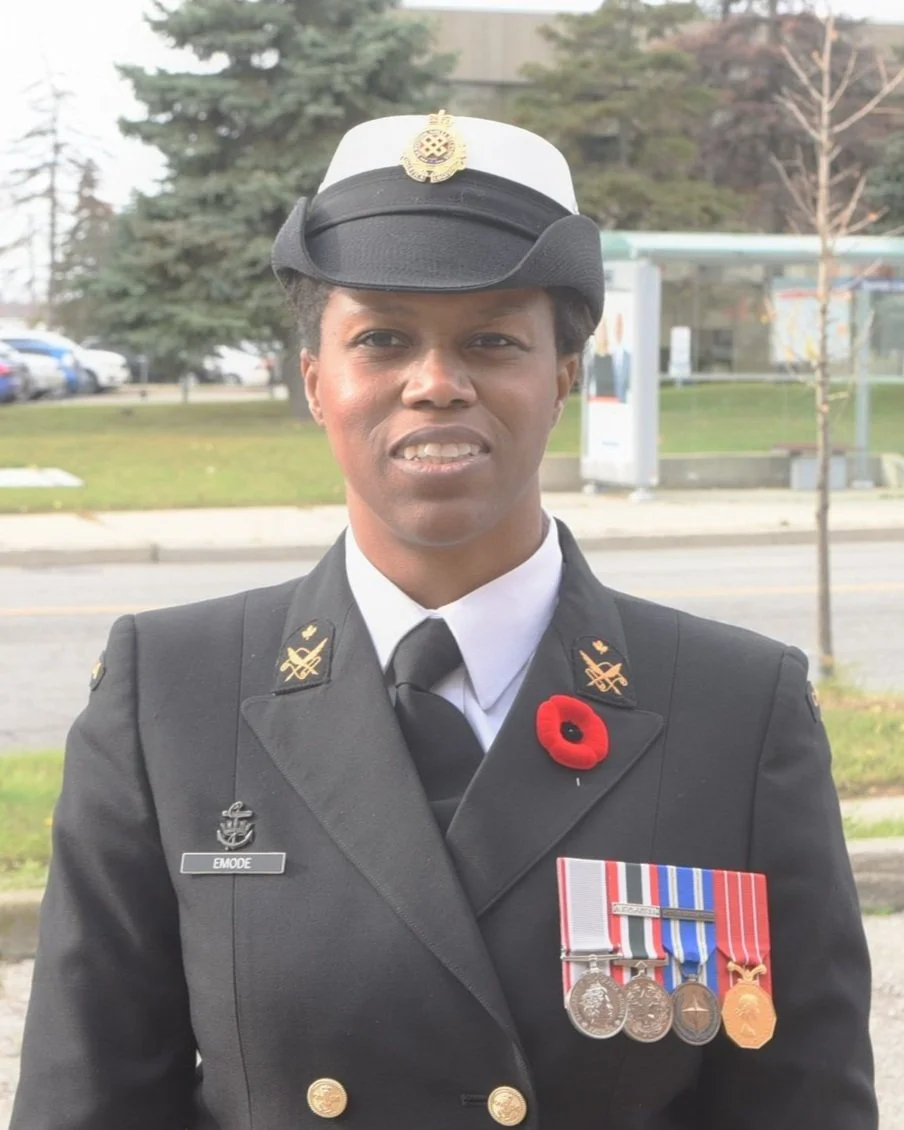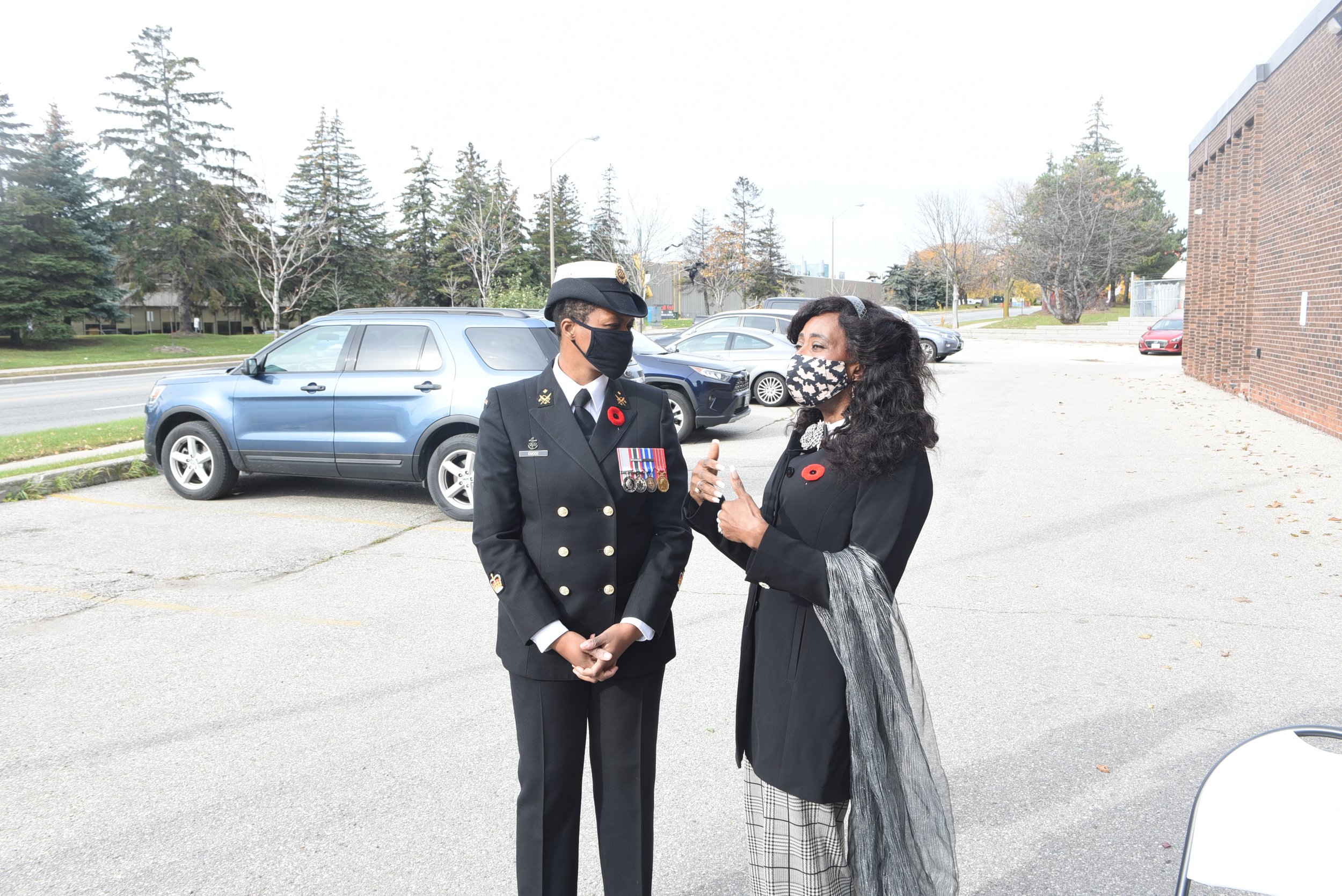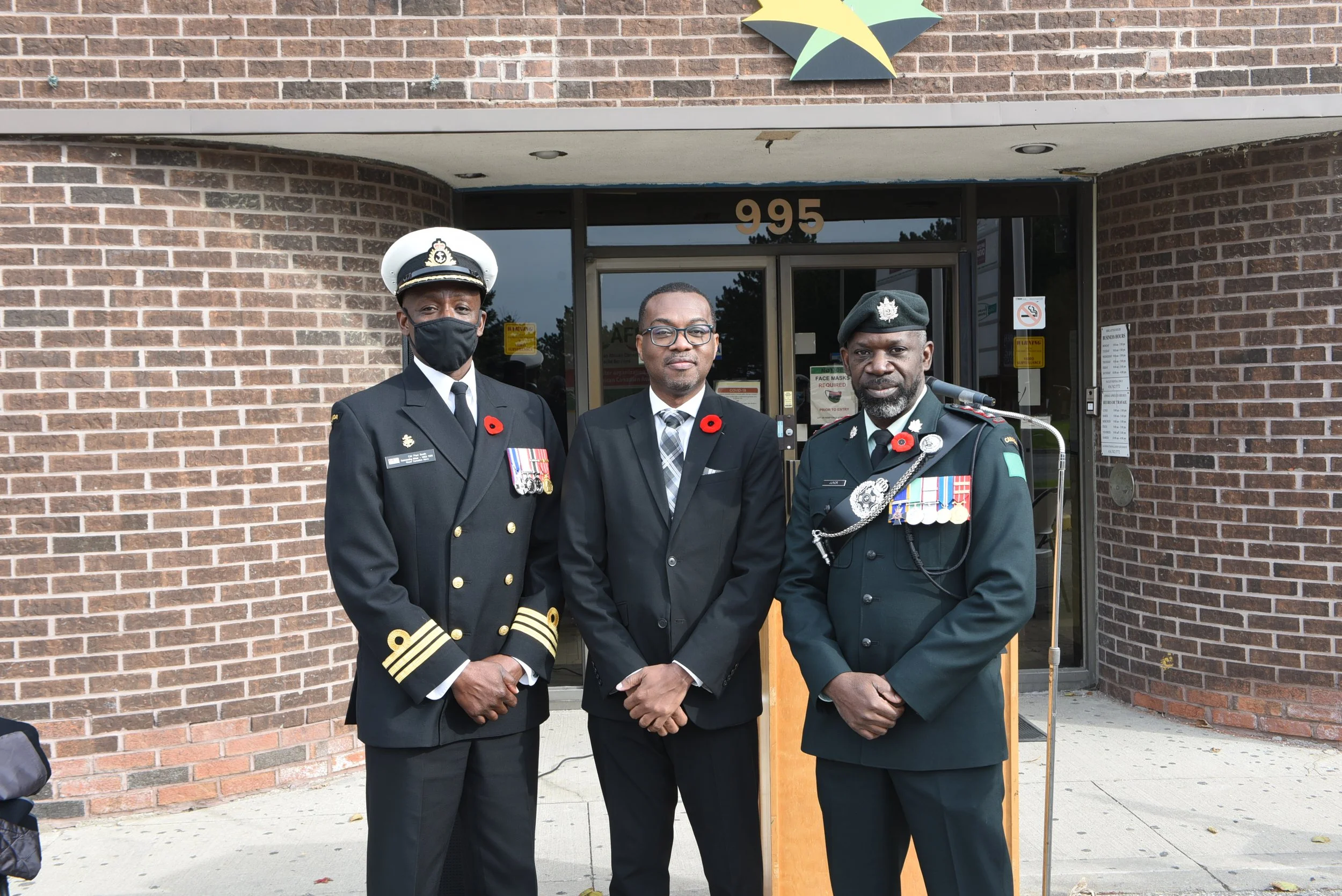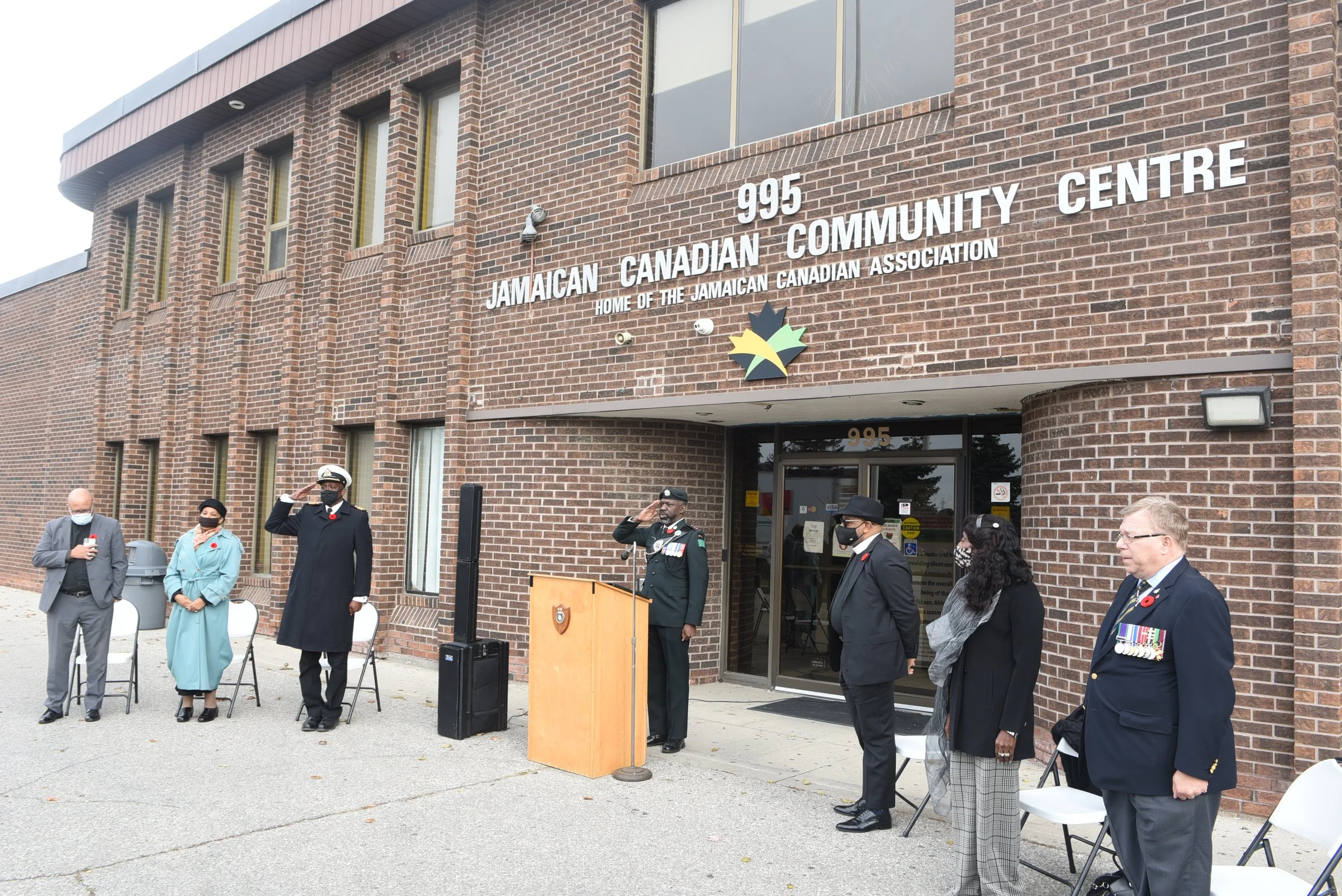Remembrance Day celebrated for first time at the Jamaican Canadian Association centre
December 3, 2021
Seeking a career offering myriad fields and opportunities, Joan Emode joined the Royal Canadian Navy (RCN) in 2002.
The First-Class Petty Officer was among a small group of military members and civilians that attended a ceremony to celebrate Black Canadian War Veterans and the sacrifices Black soldiers have made for Canada.
It took place on Remembrance Day, November 11, outside the Jamaican Canadian Association (JCA) centre.
“It’s so very important to remember those who have sacrificed a lot for us,” the Nigerian-born reservist said. “They paid the ultimate price and we should never forget that.”
An exceptional sailor, Emode was recently awarded the Meritorious Service Medal. She is the Human Resources Manager at Her Majesty Canadian Ship (HMCS) York led by Paul Smith who is the land-based company’s first Black Commander.
OHRC Chief Commissioner Patricia DeGuire (r) and First Class Petty Officer Joan Emode (Photo by Ron Fanfair)
It was his idea to stage a Remembrance Day ceremony in Toronto.
“In the last 30 years I spent in Halifax, a common theme throughout my career was being able to engage in outreach in different communities, particularly my own,” said Jamaican-born Smith. “In Halifax, I attended ceremonies on Veterans Day in Preston and Cherry Brook and I wanted to do something similar when I came back to Toronto. I felt that bringing Remembrance Day to the community and initiating some ties are just as important as recognizing the sacrifices. When you celebrate an individual community at an important ceremony, it’s not instead of but as well as.”
Smith collaborated with Kevin Junor, who spent 34 years with the Canadian Armed Forces as a Reservist, to put on the event.
“I am honoured that we are here today to remember the sailors, soldiers, aviators and special forces members who came before us, those who served and sacrificed in the name of freedom, peace and equality and bravely stood their ground to fight for human rights for themselves and fellow persons,” Smith pointed out. “They overcame unbeatable odds to secure victories for Canada and our allies.”
Jamaica’s Consul General in Toronto Lincoln Downer (c) joined Paul Smith (l) & Kevin Junor at the Remembrance Day event at the JCA centre (Photo by Ron Fanfair)
Though Canada’s military history reflects exceptional valour and sacrifice, Smith said ‘it’s sometimes incomplete’.
“We know of the important and impactful stories of the sacrifices made and successes won during the First and Second World Wars, the Korean War and Afghanistan,” he said. “As we reflect on the service and sacrifice of those who came before, we must also recognize that not everyone was able to serve equally.”
The members of Canada’s first and only Black battalion, No. 2 Construction, faced prejudice and discrimination while trying to enlist for World War 1.
“These brave and determined individuals fought for two years against injustice,” Smith added. “They fought for the right to fight. The No. 2 was sent to war without weapons and they were charged with building roads and railways, transporting lumber and maintaining supply lines and water and electrical supplies. Their service was crucial to the war effort, but they weren’t recognized for their wartime contributions when they returned home. As we think about everyone who has served our country and fought for our freedom, it is important that we think about the uncomfortable parts of our history as well.”
Blacks fought for Britain in the War of 1812 against the United States, stood firm against the Rebellions of 1837 in Upper and Lower Canada and the Fenian raids in 1866 and alongside other Canadians and this country’s allies in Europe in the two World Wars and the Korean War.
During the battle for Vimy Ridge in 1917, Private Jeremiah (Jerry) Jones single-handedly captured a German machine gun nest and its crew. Though sustaining an arm wound, he took the surviving prisoners to the Allied Lines and handed them over to his commanding officer.
In February 2010, Jones – one of 16 Black Nova Scotians recruited by the 106th Battalion Nova Scotia Rifles in 1915 after the Canadian government announced its non-discriminatory policy – was posthumously recognized for his bravery with the Canadian Forces medallion for Distinguished Service.
Corporal Marlene Clyke was one of the first Black women to serve in the Canadian Armed Forces, Seaman Raymond Lawrence – who served from 1953 to 1986 – was the first Black Chief Petty Officer and the first Black naval officer to receive the Order of Military Merit, Chief Warrant Officer Cyril Clayton was the first Black to be appointed a Canadian base Regimental Sergeant Major and Major Marguerite (Peggy) Downes, who died in 2009, was one of the highest ranking female Black officers in Canada.
Last February, the keel was officially laid for the RCN first vessel to be named after a Black person.
The fourth Arctic offshore patrol ship will bear the name of William Hall who was the first Nova Scotian and the third Canadian soldier to receive the Victoria Cross – the highest military decoration – for bravery during combat after he valiantly defended a British garrison in Lucknow, India.
Born in 1825 to American parents liberated from the American slave trade, Hall built wooden ships for the merchant marine and was a crew member on a trading vessel. Enlisting in the Royal Navy in Liverpool in 1852, he served as a naval brigade member on Her Majesty Service (HMS) Rodney during the Crimean War and was the recipient of British and Turkish medals for his combat service during the three-year war that ended in 1856.
A year later as Captain of the Foretop on board HMS Shannon, he led the successful British naval gun charge in Lucknow during the Indian mutiny.
Retiring as a Quartermaster in 1876, Hall returned to Nova Scotia to live with his sisters on a farm in Avonport, overlooking the Minas Basis. He resided in obscurity until 1901 when the Duke of Cornwall and York, who was later to become King George V, noticed Hall and his medals during a British Veterans parade in Nova Scotia.
The highly decorated solider succumbed to paralysis at home in 1904 at age 75 and was buried without military honours in an unmarked grave. He was reburied on the grounds of the Hantsport Baptist Church in 1945, eight years after a local campaign was launched to have the Canadian Legion recognize his valour.
A monument erected near his grave bears an enlarged replica of the Victoria Cross and a plaque describing his courage and devotion to duty.
A Canadian Legion branch in Halifax was renamed after Hall and a Cornwallis gym, the DaCosta-Hall Educational Program for Black students in Montreal and the annual International Tattoo Gun Run, perpetuate his name.
In 2010, Canada Post recognized Hall with a commemorative stamp.
Remembrance Day was celebrated for the first time this year at the JCA centre (Photo by Ron Fanfair)
Ontario Human Rights Commission Chief Commissioner Patricia DeGuire, Jamaica’s Consul General in Toronto Lincoln Downer and Sam Billich, who served in the Canadian and British Armed Forces, were also among the attendees at the Remembrance Day ceremony at the JCA centre.









